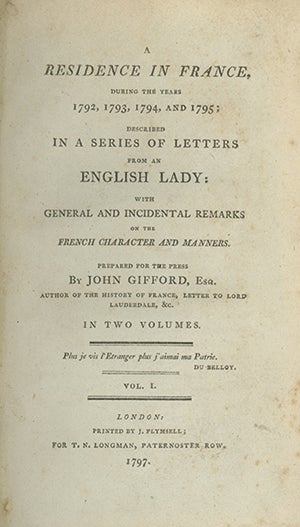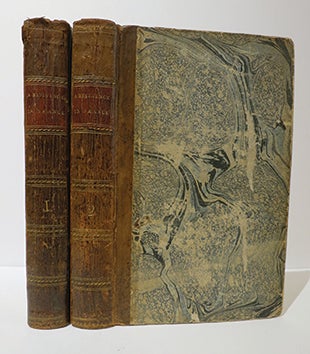A Residence in France, during the Years 1792, 1793, 1794, and 1795; Described in a Series of Letters from an English Lady: With General and Incidental Remarks on the French Character and Manners. Prepared for the Press by John Gifford, Esq.
Place and Imprint: London: Printed by J. Plymsell; for T. N. Longman, 1797.
Edition: First edition.
Bibliographical References: ESTC N12984.
Condition: Some minor dust-soiling and spots in the text; edges rubbed; very good copy.
Book ID: 28318
Physical Description
2 vols, 8vo, contemporary quarter tree-calf, marbled paper boards, red morocco spine labels, gilt rules and lettering. Without the half-titles.Comments
Rachel Charlotte Biggs was acquainted with France when she traveled by herself there in 1792 to aid an aristocratic lady friend, during which time she witnessed the Revolution during its grim climax. Out of concern for their safety, Biggs and her companion moved from Paris north to Amiens and other nearby towns. At one point Biggs was under arrest on suspicion of being a spy. Her impressive memoir of this experience, in letters to her brother, is distinctly loyalist and dedicated with “extreme diffidence” to Edmund Burke. Biggs reports sympathetically on the effects of the Revolution on the lives of shopkeepers, clergy, women in convents, aristocrats (with whom she travels), farmers, et al.; she scolds the English partisans of the Revolution – the “literary banditti” and “Robespierrians” – as being naive. She writes about the trials of Charlotte Corday, the Rolands, and others, and she evaluates the predicament of Thomas Paine, whom she thought, despite his faults, was not of cruel or unmerciful nature. Biggs published her Residence in France anonymously, and it was not correctly attributed to her until fairly recently. For many years the authorship was attributed to Helen Maria Williams, but anyone who made that attribution had not read any part of Biggs’ work. Later Biggs was instrumental in promoting the Royal Jubilee of 1809; she also continued to travel, and it has been suspected that during the Napoleonic years she was a spy in Europe for English interests, as perhaps she was during the Revolution, as well. See Stuart Semmel, “Radicals, Loyalists, and the Royal Jubilee of 1809,” Journal of British Studies (2007).Price: $650.00
See all items in
Women Travelers,
Women Writers
See all items by RACHEL CHARLOTTE BIGGS


